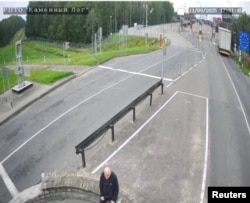VILNIUS -- Radio Free Europe/Radio Liberty journalist Ihar Losik has been freed after spending more than five years in brutal Belarusian detention on trumped-up charges, part of the latest release of political prisoners amid a thawing of relations between Minsk and the United States.
Losik arrived in neighboring Lithuania on September 11 along with 50 others, hours after leaving a prison in northern Belarus.
"I'm in complete shock, truly, but of course I am happy now," he said as he met with RFE/RL staff and management after a long bus ride to Vilnius.
Just a day after waking up in solitary confinement, Losik said that after the morning check by guards, "they came and said, 'Pack your things.'"
"They put me in a car, a bag over my head, handcuffs, brought me to...the KGB," he said referring to the Belarus secret service, where he joined a group of a dozen other political prisoners being released as part of a deal negotiated by the White House.
The group was joined by other prisoners being released and then transported by bus to the border zone with Lithuania.
As part of the deal for their freedom, the group was told they must leave the country, which 51 of them did.
One, opposition politician Mikalay Statkevich, however, refused to leave the country and reportedly remained in the neutral zone of the Belarusian-Lithuanian border, as of late on September 11.
"There were several attempts to persuade him by American diplomats, his wife, and another woman," said Yauhen Vilski, another opposition figure who said he tried to convince the 69-year-old to join them.
Minsk-Washington Thaw
The release of the prisoners coincided with a meeting earlier in the day between US envoy John Coale and Belarus' long-ruling authoritarian strongman Aleksandr Lukashenko in Minsk.
In the meeting, shown on state TV, Coale was shown praising Lukashenko and passing along personal greetings from US President Donald Trump. He also presented Lukashenko with a pair of White House cuff links.
Coale announced that the United States would lift a 2-year-old sanctions on Belarus's national airline, Belavia, and would seek to reopen its embassy in Minsk, which was closed shortly after Russia launched its all-out invasion of Ukraine in February 2022.
The release of prisoners and other goodwill gestures are the latest sign that Lukashenko is trying to rekindle relations with the West. Long considered a pariah and dubbed "Europe's last dictator," Lukashenko has walked a tightrope between Russia -- which is Belarus's largest trading partner -- and the West.
After the 2020 presidential election in which Lukashenko claimed victory, opposition groups declared the results a sham and sparked weeks of massive protests. Lukashenko's security forces responded with a brutal crackdown, arresting over 30,000 people, many of whom reported torture and ill-treatment while in custody.
The crackdown pushed most opposition politicians to leave Belarus fearing for their safety and freedom.
Many Western governments have refused to recognize the results of the 2020 election and do not consider Lukashenko to be the country's legitimate leader.
Among those caught up in the post-election crackdown was Losik, 33, who was sentenced to 15 years in prison in December 2021 for what the authorities said was "organizing mass riots, taking part in mass disorder, inciting social hatred," and other unspecified charges relating to post-election unrest.
Journalist Larysa Shchyrakova spent years in a women's prison in her hometown of Homel before being released.
She wept as she briefly spoke to reporters, noting that her freedom came with a bitter taste as she cannot return home and visit the grave of her mother, who died while she was in prison.
"We are immensely grateful to President Trump for securing the release of yet another brave RFE/RL journalist unfairly detained by Belarusian authorities," RFE/RL President and CEO Steve Capus said in a statement from Vilnius.
Capus lauded the role played by Coale, US Secretary of State Marco Rubio, the Lithuanian government, and the press freedom community for "their consistent support of RFE/RL's imprisoned journalists."
"Ihar suffered horribly because he was a journalist working for RFE/RL. This phase of his excruciating and wholly unfair ordeal, which stretched beyond five years, is finally over," Capus added.
Among those also released was Alena Tsimashchuk, who had worked at RFE/RL's headquarters in Prague as part of the Vaclav Havel Journalism Fellowship.
In a move that was widely criticized by free press advocates, she was detained in September 2023 on extremism charges and was convicted and sentenced to five years in prison.
"Alena is a young woman at the start of her career who had two years of her life stolen from her," Capus said.
Losik, RFE/RL, and Western governments said repeatedly that the charges against him were politically motivated.
He was tried together with popular blogger and potential Lukashenko opponent Syarhey Tsikhanouski, who appeared poised to mount a serious challenge to the president.
Tsikhanouski was released from prison in June along with 13 other prisoners -- including another former RFE/RL journalist, Ihar Karnei.
Losik's release comes less than a month after Trump phoned Lukashenko -- the first time a sitting US president had directly called the Belarusian leader during his 31 years in power -- to thank the Belarusian strongman for the June prisoner release.
Trump described the call as "very good" while saying the release of additional prisoners was discussed. In February, Andrey Kuznechyk, another journalist with RFE/RL's Belarus Service, was freed after being held for more than three years on similar charges.
In the more than five years since he was first taken into custody, Losik, who worked for RFE/RL's Belarus Service, known locally as Radio Svaboda, endured isolation and significant physical and psychological pressures.
Losik had not been heard from in about two years aside from a being paraded before a camera on a Belarusian state TV propaganda program in January that accused jailed RFE/RL journalists of "trying to set Belarus on fire."
Losik spent most of his imprisonment in the Navapolatsk colony, where, for a year and a half, the administration denied him any communication with family and access to care packages.
According to accounts from former inmates, Losik was frequently placed in a punishment cell.
All four of Losik's defense attorneys have either left the country or been stripped of their licenses.
Journalist's Family Targeted
Darya Losik, Ihar's wife, was sentenced to two years in prison in January 2023 on a charge of facilitating extremist activity. She was released in an amnesty in July 2024.
Meanwhile, his younger brother fled Belarus in July after being sentenced to three years for "extremist activities" for sending photos of Russian military equipment to the Telegram channel Belaruski Hajun.
Some 1,200 political prisoners still remain behind bars in the country, including Maryya Kalesnikava, one of Belarus' most prominent political leaders.
Kalesnikava, sentenced to 11 years in prison after resisting forced deportation and leading opposition efforts against Lukashenko, was a key campaign leader for Svyatlana Tsikhanouskaya when she took up the campaign to oust the Belarus leader after her husband, was incarcerated.
The September 11 prisoner release included 14 foreigners -- six Lithuanians, two Latvians, two Poles, two Germans, one French national and one UK national -- according to the Belarusian presidency's press service.

















